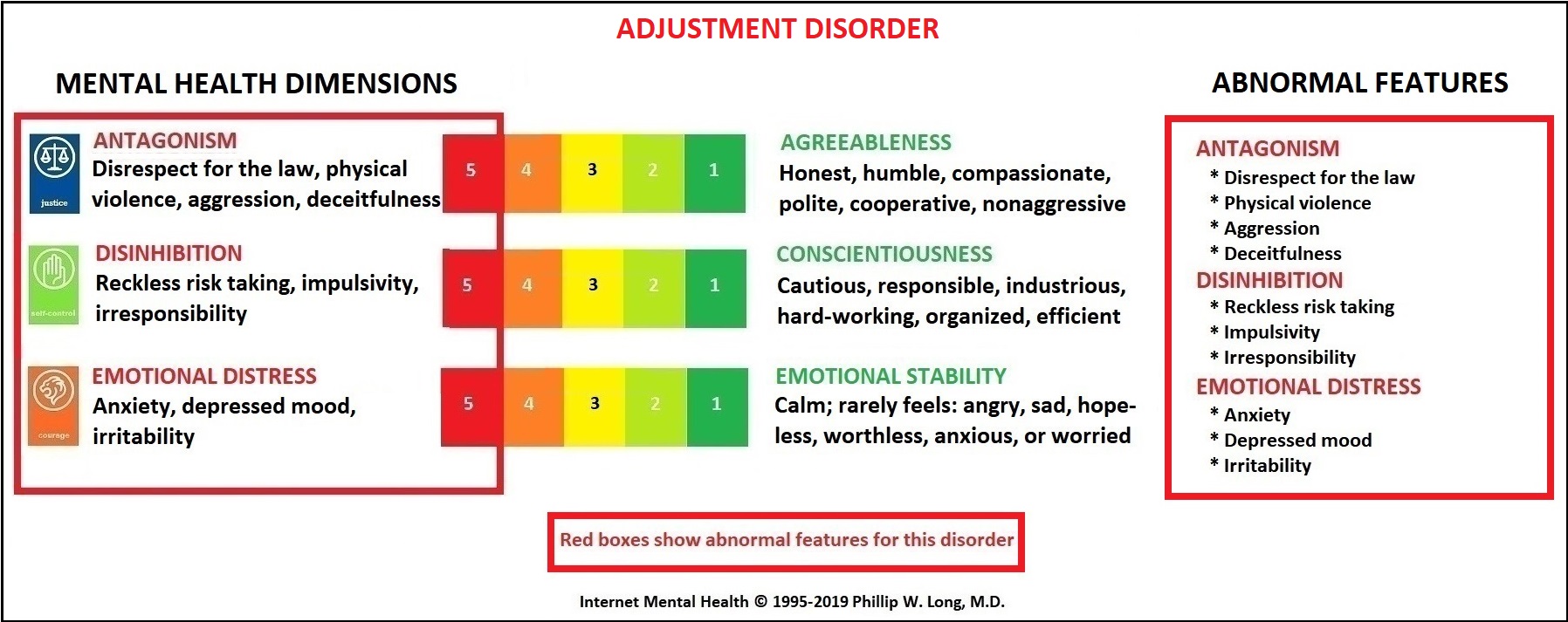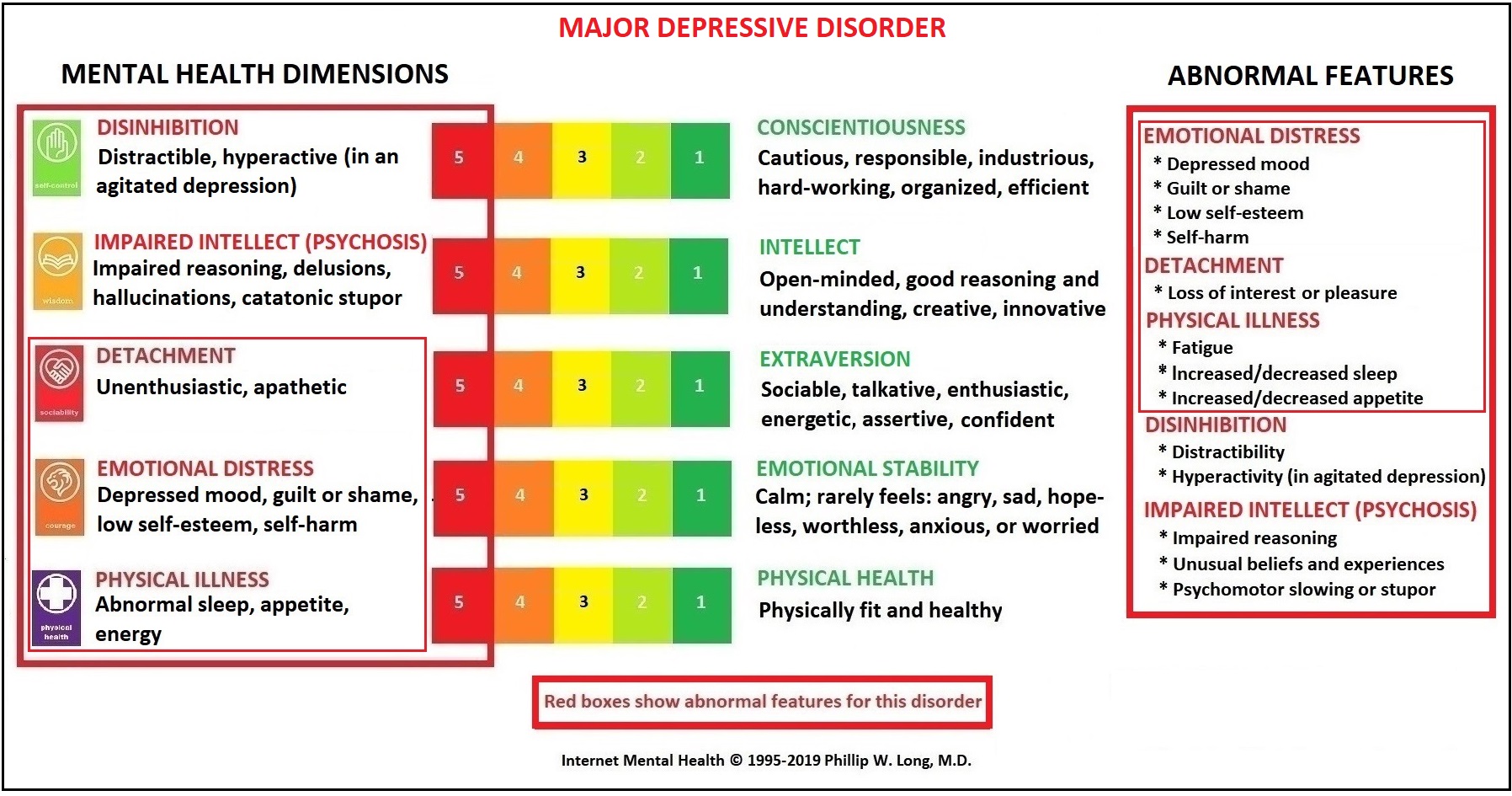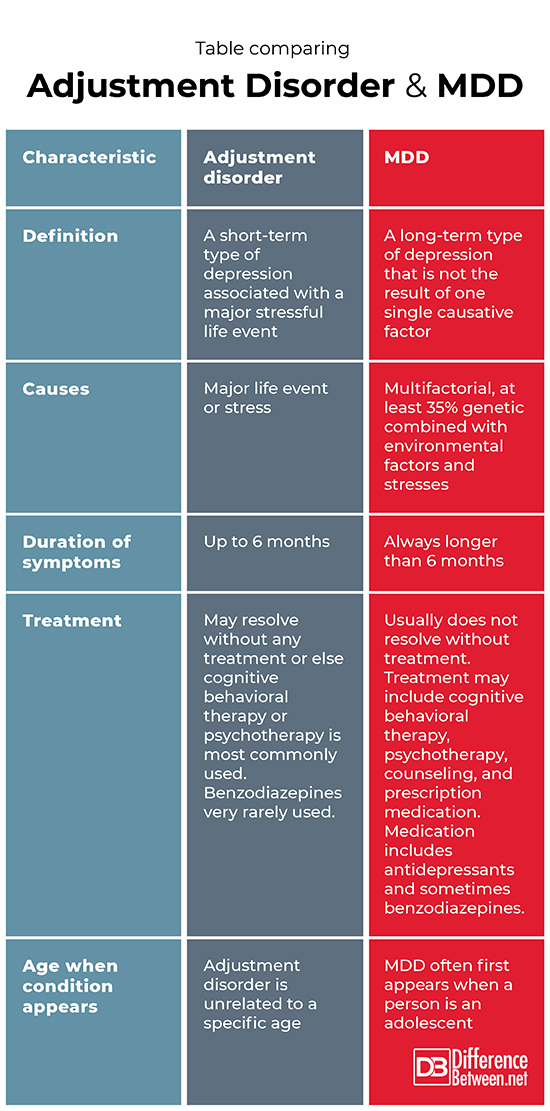Difference Between Adjustment Disorder and MDD
Adjustment disorder is a depressive state that happens because of a stressful life event and it lasts for only a short time. MDD is major depressive disorder that lasts a long time and is caused by many factors.
What is Adjustment Disorder?
Definition:
Adjustment disorder is a short-term temporary depressive episode that happens in response to some major stressful life event.
Symptoms:
Symptoms of adjustment disorder are similar to major depression but they do not persist for a long time period. The person does feel sadness, feelings of hopelessness, change in appetite and disturbances in sleep. Symptoms may also include anxiety, tearfulness, irritability, and withdrawal from normal activities. Symptoms often resolve after a period of time even without treatment.
Causes:
The cause of adjustment disorder is a major life stress event such as a death in the family, the diagnosis of a severe illness, or even the loss of income when a person loses their job.
Diagnosis:
Adjustment disorder is diagnosed based on the presence of symptoms in response to a major stressor. The symptoms do not last longer than 6 months and may even resolve without any treatment.
Treatment:
Treatment of adjustment disorder can include cognitive behavioral therapy and only sometimes the short-term use of benzodiazepine medications. The adjustment disorder condition usually goes away after about 6 months.
What is MDD?
Definition:
MDD is major depressive disorder that is sometimes also called unipolar disorder. The condition is classified as a type of mental illness in which a person feels so sad that they are unable to function normally in everyday life.
Symptoms:
Symptoms include feeling fatigued, feeling sadness, losing interest in activities which normally bring pleasure, difficulty focusing and concentrating on anything, and sleep is often disturbed in some way. Patients may also often feel suicidal when they have MDD. People with MDD often look very sad as shown by their facial expressions, and they often may become neglectful of personal hygiene and may eat poorly.
Causes:
The causes of MDD are not known for certain but are thought to involve a mix of genetic and environmental factors. Genetic changes impact the serotonin that is produced in the brain, which is associated with MDD symptoms. Serotonin is a neurotransmitter chemical that influences mood and thus disturbances to the levels of this chemical have been found to be associated with depressive symptoms. Major depressive disorder is believed to be at least 35% genetic and is thus present in many individuals and multiple generations of the same family. Childhood physical and sexual abuse, are also potential causes of MDD later in life.
Diagnosis:
The MDD is diagnosed by a psychiatrist and is based on a person having the symptoms of MDD for at least a period of 14 days continuously. The condition is also present for a much longer time than adjustment disorder, usually lasting for much longer than 6 months.
Treatment:
There are a variety of good options for treating major depressive disorder. For some patients, psychotherapy or cognitive behavioral therapy helps with the symptoms. Most of the time patients do also need to be prescribed prescription medication including antidepressants. Antidepressants that are used are most commonly either in the classes of monoamine oxidase inhibitors or selective serotonin reuptake inhibitors. In some cases, benzodiazepines may also be prescribed for anxiety but these are very addictive and thus are not normally given long term. MDD can be difficult to treat effectively with some patients needing to try different options to gain relief from their symptoms.
Difference between Adjustment Disorder and MDD
Definition
Adjustment disorder is only a short-term form of depression that occurs due to a major stressful life event that has taken place. Major depressive disorder is a long-term type of depression which is caused by many factors.
Causes
Adjustment disorder is always caused by one major stress in a person’s life. MDD is caused by a combination of factors, including genetics.
Duration of symptoms
The symptoms of adjustment disorder only last for about 6 months. The symptoms of MDD usually last longer than 6 months.
Treatment
Treatment for adjustment disorder can include psychotherapy or cognitive behavioral therapy and only rarely, benzodiazepine drugs; and the condition can resolve on its own sometimes. Treatment for MDD includes psychotherapy or cognitive behavioral therapy and medications such as antidepressants and benzodiazepines; MDD is a condition for which treatment is always needed.
Age when condition appears
Adjustment disorder does not usually happen at a specific age since it is related to a stressful event. MDD often begins during late adolescence.
Table comparing Adjustment Disorder and MDD
Summary of Adjustment Disorder Vs. MDD
- Adjustment disorder and MDD are both conditions that have symptoms of depression.
- Adjustment disorder is a short-term maladaptive response to some major stressful event that has taken place in a person’s life.
- MDD is a long-term problem due to several factors including genetics.
- In both MDD and adjustment disorder, cognitive behavioral therapy and psychological therapy may be helpful for treatment.
- Difference Between Rumination and Regurgitation - June 13, 2024
- Difference Between Pyelectasis and Hydronephrosis - June 4, 2024
- Difference Between Cellulitis and Erysipelas - June 1, 2024
Search DifferenceBetween.net :
Leave a Response
References :
[0]Image credit: https://mentalhealth.com/home/imhimages/6_Factor_Major_Depressive.jpg
[1]Image credit: https://www.mentalhealth.com/home/imhimages/6_Factor_Adjustment.jpg
[2]Daniele, Antonella, et al. "Serotonin transporter polymorphism in major depressive disorder (MDD), psychiatric disorders, and in MDD in response to stressful life events: causes and treatment with antidepressant." In vivo 25.6 (2011): 895-901.
[3]Otte, Christian, et al. "Major depressive disorder." Nature Reviews Disease Primers 2 (2016): 16065.
[4]Snyder, Stephen, James J. Strain, and Dennis Wolf. "Differentiating major depression from adjustment disorder with depressed mood in the medical setting." General hospital psychiatry 12.3 (1990): 159-165.



